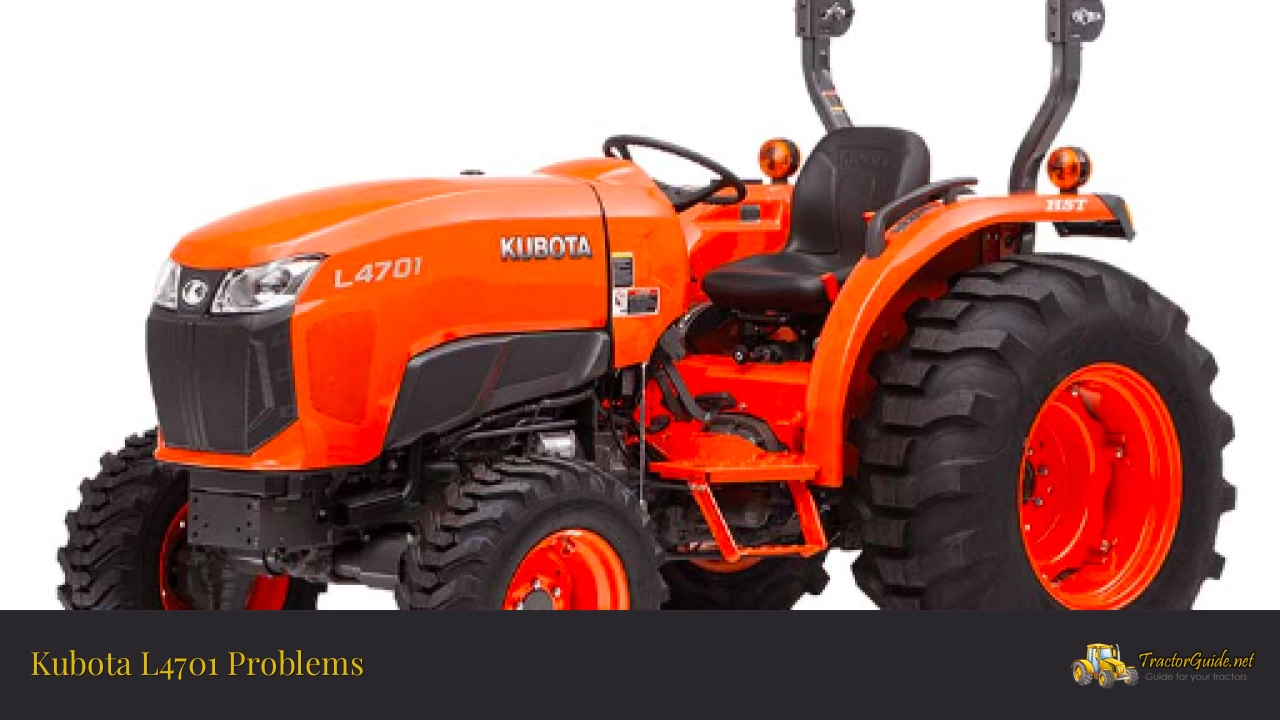The Kubota L4701 is a highly regarded compact utility tractor known for its reliability and performance in various agricultural and landscaping tasks. However, like any piece of machinery, it can encounter a range of problems that may hinder its efficiency. Understanding these common issues and their solutions is essential for maintaining the tractor’s performance and longevity. This article delves into the frequent problems faced by Kubota L4701 owners, offering detailed explanations, preventative measures, and solutions to ensure optimal operation.
Common Problems with the Kubota L4701
Engine Performance Issues
Engine-related problems are among the most critical issues that can affect the Kubota L4701. These issues can lead to significant operational downtime if not addressed promptly.
- Starting Difficulties: Many users report challenges starting the engine, especially in cold weather. This can be due to a weak battery, faulty starter motor, or worn spark plugs. Regularly checking and maintaining these components can prevent starting issues.
- Power Loss: A noticeable loss of power during operation can be frustrating. This may stem from fuel system problems, air intake issues, or internal engine wear. Regular maintenance, including fuel filter changes and air filter inspections, is essential.
- Excessive Smoke: The presence of black or blue smoke from the exhaust indicates potential internal engine problems. This could be linked to fuel quality or engine wear, necessitating immediate attention to avoid severe damage.
Hydraulic System Problems
The hydraulic system is crucial for operating implements like loaders and backhoes effectively. Issues in this system can severely impact productivity.
- Hydraulic Fluid Leaks: Leaks from hoses or fittings can lead to a significant loss of hydraulic fluid, affecting performance. Regular inspections of hoses and seals are vital for early detection.
- Slow Hydraulic Response: If the hydraulic implements respond slowly, it may indicate a clogged filter or inadequate fluid levels. Cleaning or replacing the hydraulic filter and ensuring proper fluid levels are necessary steps.
- Overheating: Prolonged use in high temperatures can cause overheating in the hydraulic system. It’s advisable to monitor usage patterns and consider installing an auxiliary cooler if overheating persists.
Transmission Issues
Transmission problems can significantly affect the tractor’s performance and usability.
- Hard Shifting: Difficulty in shifting gears can lead to frustration and inefficiency. This may be caused by low transmission fluid levels or worn components. Regularly checking fluid levels and replacing worn parts will help alleviate this issue.
- Transmission Noise: Unusual noises coming from the transmission indicate potential mechanical problems that require immediate investigation. Regular maintenance checks are essential to catch these issues early.
- Slipping Gears: If the tractor frequently slips out of gear, it poses safety risks during operation. This issue often requires professional assessment to determine whether repairs or replacements are necessary.
Electrical System Challenges
The electrical system is integral to the tractor’s functionality, powering everything from lights to critical sensors.
- Battery Drain: A rapidly draining battery can prevent the tractor from starting. This issue could arise from faulty wiring or a defective battery. Regular checks of the battery condition and wiring integrity are crucial for prevention.
- Sensor Malfunctions: Problems with sensors can lead to inaccurate readings on gauges like fuel levels or engine temperature. Ensuring that sensors are correctly calibrated and replaced when faulty will help maintain accurate readings.
Cooling System Concerns
Maintaining an effective cooling system is vital for preventing overheating and ensuring optimal engine performance.
- Clogged Radiators: Dust and debris can clog radiator fins, reducing cooling efficiency. Regular cleaning of the radiator is essential to ensure proper airflow.
- Coolant Leaks: Leaks in hoses or connections can lead to coolant loss, resulting in overheating. Inspecting hoses regularly for wear and tear will help maintain coolant levels.
Preventative Maintenance Tips
Regular maintenance is key to preventing many common issues associated with the Kubota L4701:
- Scheduled Service: Follow the manufacturer’s recommended service schedule for oil changes, filter replacements, and general inspections.
- Quality Parts: Always use high-quality replacement parts and fluids to ensure optimal performance.
- Early Detection: Keep an eye out for any changes in performance or unusual sounds; addressing these issues early can prevent more significant problems down the line.
| Problem | Possible Causes | Solutions |
|---|---|---|
| Engine Overheating | Clogged radiator, coolant leak | Clean radiator; check coolant levels |
| Difficulty Starting | Low battery charge | Check battery; replace faulty components |
| Hydraulic Fluid Leaks | Worn hoses or seals | Inspect hoses; replace damaged parts |
| Hard Shifting | Low transmission fluid | Check fluid levels; replace worn components |
| Electrical Failures | Faulty wiring | Inspect wiring; replace defective parts |
Conclusion
The Kubota L4701 is a robust tractor that offers excellent utility across various applications; however, it is not without its challenges. By being aware of common problems such as engine performance issues, hydraulic system failures, transmission troubles, electrical challenges, and cooling system concerns, owners can take proactive steps to maintain their tractors effectively. Regular inspections, timely repairs, and adherence to maintenance schedules will ensure that your Kubota L4701 remains a reliable asset on your farm or job site.
FAQs
What should I do if my Kubota L4701 won’t start?
Check the battery charge and starter motor condition; replacing faulty components may be necessary.
How often should I change the oil in my Kubota L4701?
Follow the manufacturer’s recommendations for oil changes based on hours of operation or annually.
What causes hydraulic fluid leaks?
Leaks typically result from worn hoses or seals that need inspection and replacement if damaged.
How can I improve my tractor’s fuel efficiency?
Regularly clean or replace fuel filters and ensure proper air intake to enhance fuel efficiency.
What maintenance tasks should I prioritize?
Focus on regular oil changes, filter replacements, and inspections of critical systems like hydraulics and electrical components.
